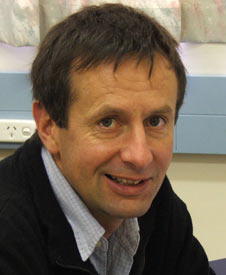 Tuesday 7 August 2018 11:32am
Tuesday 7 August 2018 11:32am
Dr Garry Nixon
The University of Otago has reiterated its commitment to training and education in rural health with the establishment of a new Section of Rural Health, believed to be the first dedicated rural health unit currently operating within a New Zealand tertiary institution.
The new group will sit within the Department of General Practice and Rural Health at the Dunedin School of Medicine. The current Rural Postgraduate Programme, the Rural Medical Immersion Programme and rural research will all come together to form the new Section.
Current Director of the Rural Postgraduate Programme, Dr Garry Nixon, who lives in Central Otago and works as a rural hospital generalist at Dunstan Hospital in Clyde, will take up the new role of Head of the Section of Rural Health.
Dr Nixon says he is excited the concept has become a reality after years of planning a strategic direction for rural health within the University of Otago. He considers it is significant because while in Australia there are a number of rural clinical schools and university departments of rural health, there is currently nothing similar in New Zealand. About 20 years ago, for a period of time, a Centre for Rural Health operated within the University of Otago, Christchurch.
Dean of the Otago Medical School, Professor Peter Crampton, says the launch of the section of rural health is an important step forward in the development of dedicated academic capacity in the area of rural health.
“The Section will provide New Zealand with much needed research, commentary and interpretation related to the health needs of rural communities,” Professor Crampton says.
Ultimately the Section, which Dr Nixon describes as a “virtual campus”, has been established to support training and education within the rural health sector.
“It is an important step along the way of a rural health structure that is visible within the University and in rural New Zealand,” Dr Nixon says.
“It will be embedded in rural communities and day-to-day rural clinical practice, providing specific support for students and staff in rural areas and helping build rural health academic capacity.”
The move is consistent with the proposal developed last year by the University, together with the University of Auckland, Auckland University of Technology and the Royal New Zealand College of General Practitioners, for a national school of rural health. That proposal, currently being considered by the government, is for various tertiary providers and professional bodies to share infrastructure and resources in rural communities.
“A national school of rural health would need a 'home' within each of the partner institutions and this would help set up the Dunedin School of Medicine and Department of General Practice and Rural Health to potentially be that home within the University of Otago,” Dr Nixon explains.
“Importantly, it will increase the number of staff living and working in rural communities, help ensure teaching in these communities is more coordinated, as well as increasing capacity for rural research.”
Head of the Department of General Practice and Rural Health Professor Tim Stokes, says while the section and department administratively sit within the Dunedin School of Medicine, it is committed to furthering the development of an interprofessional approach to rural health.
“This will be achieved through fostering strong links with other health professional programmes across the University's Division of Health Sciences,” Professor Stokes says.
Dean of the Dunedin School of Medicine, Professor Barry Taylor, says the new Section of Rural Health is a natural development within the school.
“The Dunedin School of Medicine is based within the most rural of all district health boards and where there has been a long-term commitment to training in the rural environment.”
For further information, contact:
Dr Garry Nixon,
Head of the Section of Rural Health,
Dunedin School of Medicine
Mob 021 178 2662
Email garry.nixon@otago.ac.nz
A list of Otago experts available for media comment is available elsewhere on this website.
Electronic addresses (including email accounts, instant messaging services, or telephone accounts) published on this page are for the sole purpose of contact with the individuals concerned, in their capacity as officers, employees or students of the University of Otago, or their respective organisation. Publication of any such electronic address is not to be taken as consent to receive unsolicited commercial electronic messages by the address holder.